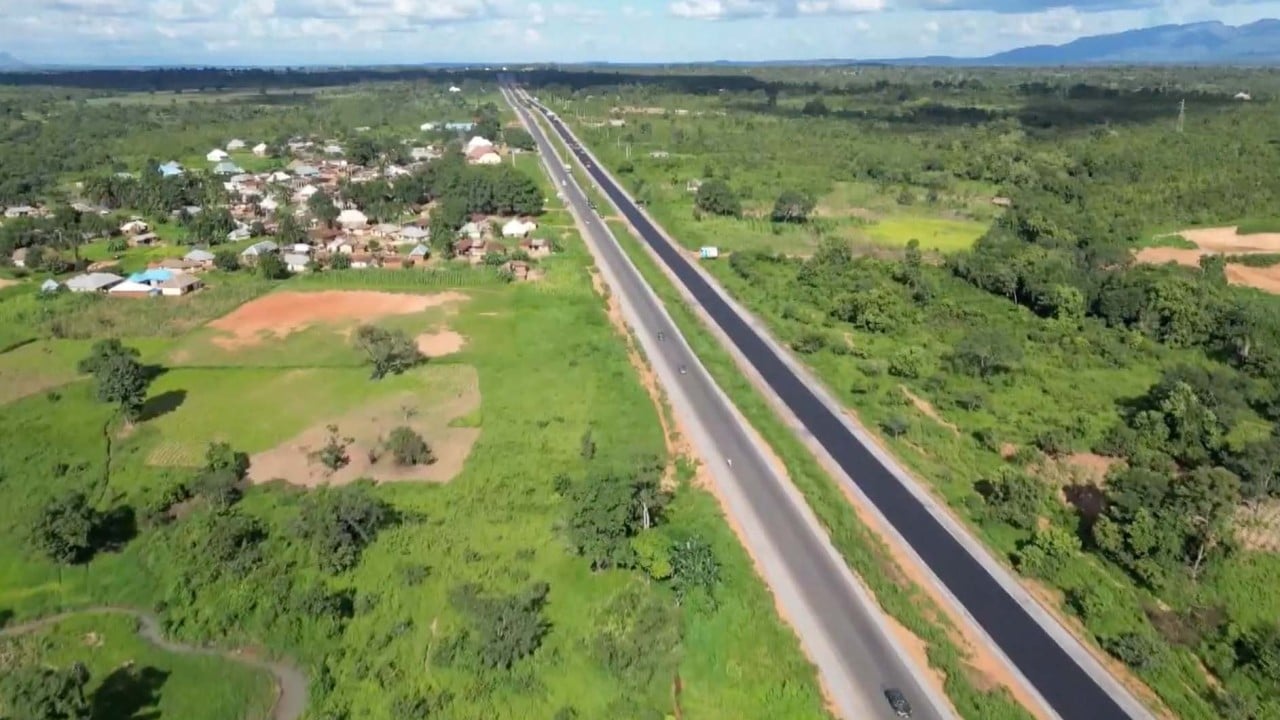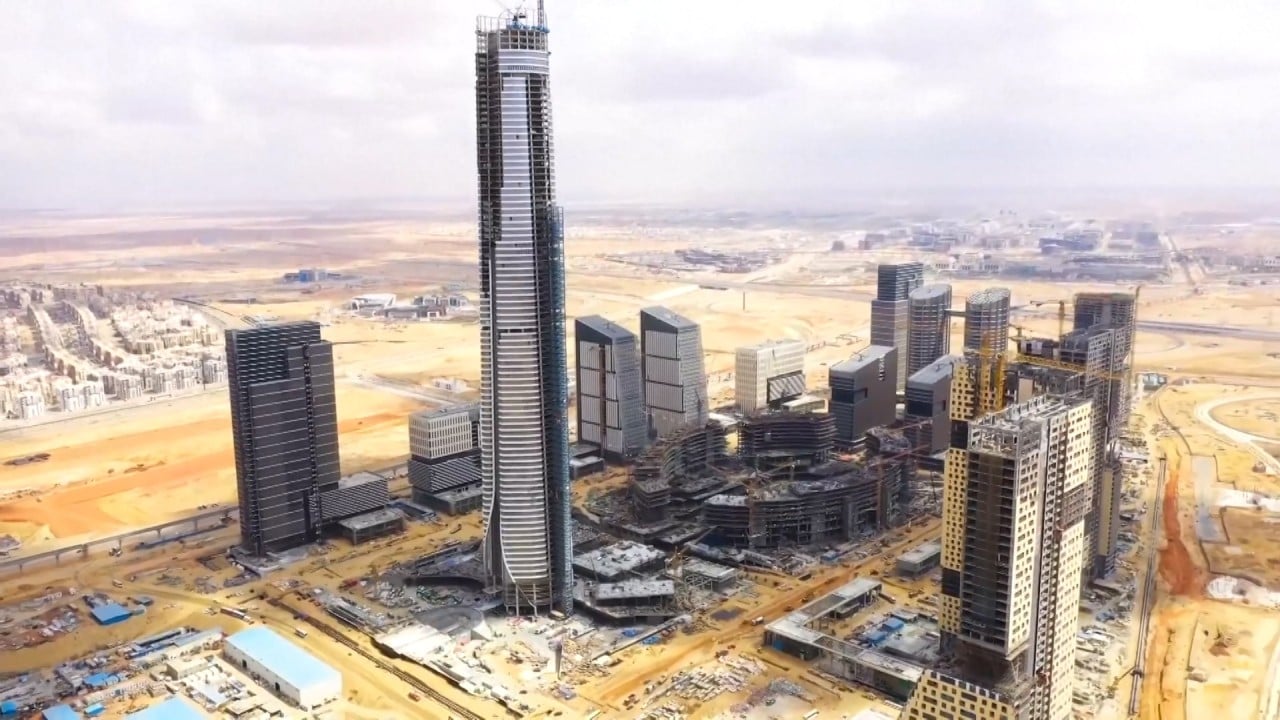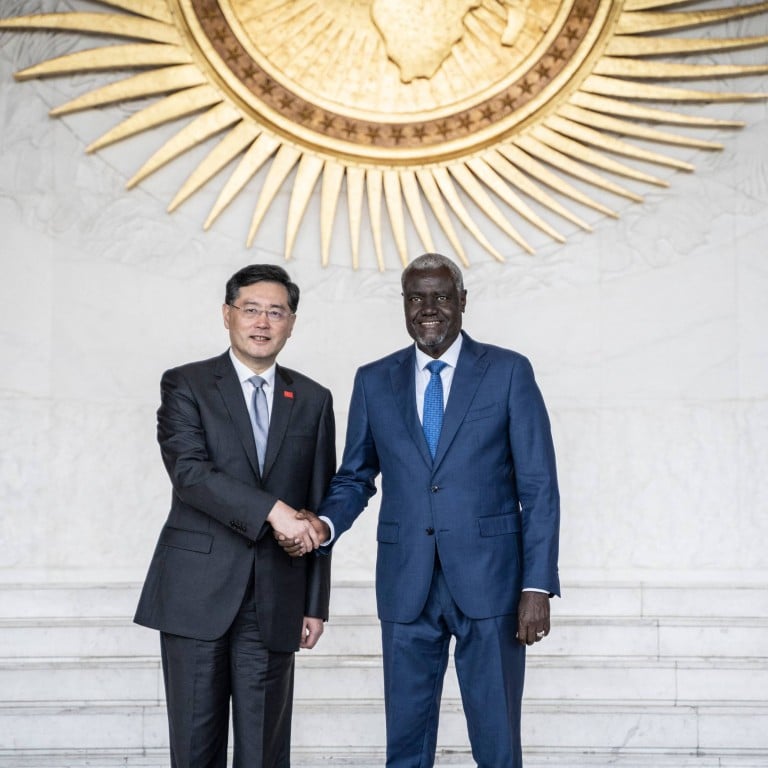
Chinese Foreign Minister Qin Gang’s 5-nation African tour a show of solidarity, strategic importance, analysts say
- Qin Gang’s first stop was Ethiopia, which borrowed US$13.7 billion from China between 2000 and 2020 and has been seeking to restructure its debts
- China will encourage more interactions, Qin tells African Union Commission chairman in Addis Ababa
China accused the US of meddling in Ethiopia’s internal affairs.
Qin’s other visits on the week-long African tour – to Angola, Gabon, Benin and Egypt – were also strategic for China’s diplomatic and economic ambitions, the observers said.
Beijing has high stakes in Ethiopia. The country plays host to over 400 Chinese companies and firms engaged in manufacturing, energy and infrastructure projects worth a combined US$4 billion, according to Paul Nantulya, a China-Africa expert with the Africa Centre for Strategic Studies at the National Defence University in Washington.
In March 2021, the two countries signed a landmark agreement on police and law enforcement cooperation to provide security for Chinese investments, assets and personnel in the country.
Ethiopia is also a major security partner. Since 2015, senior Ethiopian officers have attended the Ethiopia Senior Leaders Course at China’s National Defence University as the capstone course at the highest point of their careers.
China pledges support for reconstruction efforts in war-torn Ethiopia
However, Ethiopia is highly indebted to China. It borrowed US$13.7 billion from China between 2000 and 2020, according to the Chinese Loans to Africa Database at Boston University’s Global Development Policy Centre. And, since 2021, Ethiopia has been seeking to restructure its debt to foreign lenders, including China.
Qin is said to have promised that China will cancel an unspecified amount of debt.
Nantulya said the Tigray conflict had put China in a very difficult and awkward position, given its strong ties to both the current administration of Prime Minister Abiy Ahmed and Ethiopia’s former government, which was led by the Tigray People’s Liberation Front (TPLF).
Notably, China had not used those connections to bring the two sides together like it did with Sudan and South Sudan.
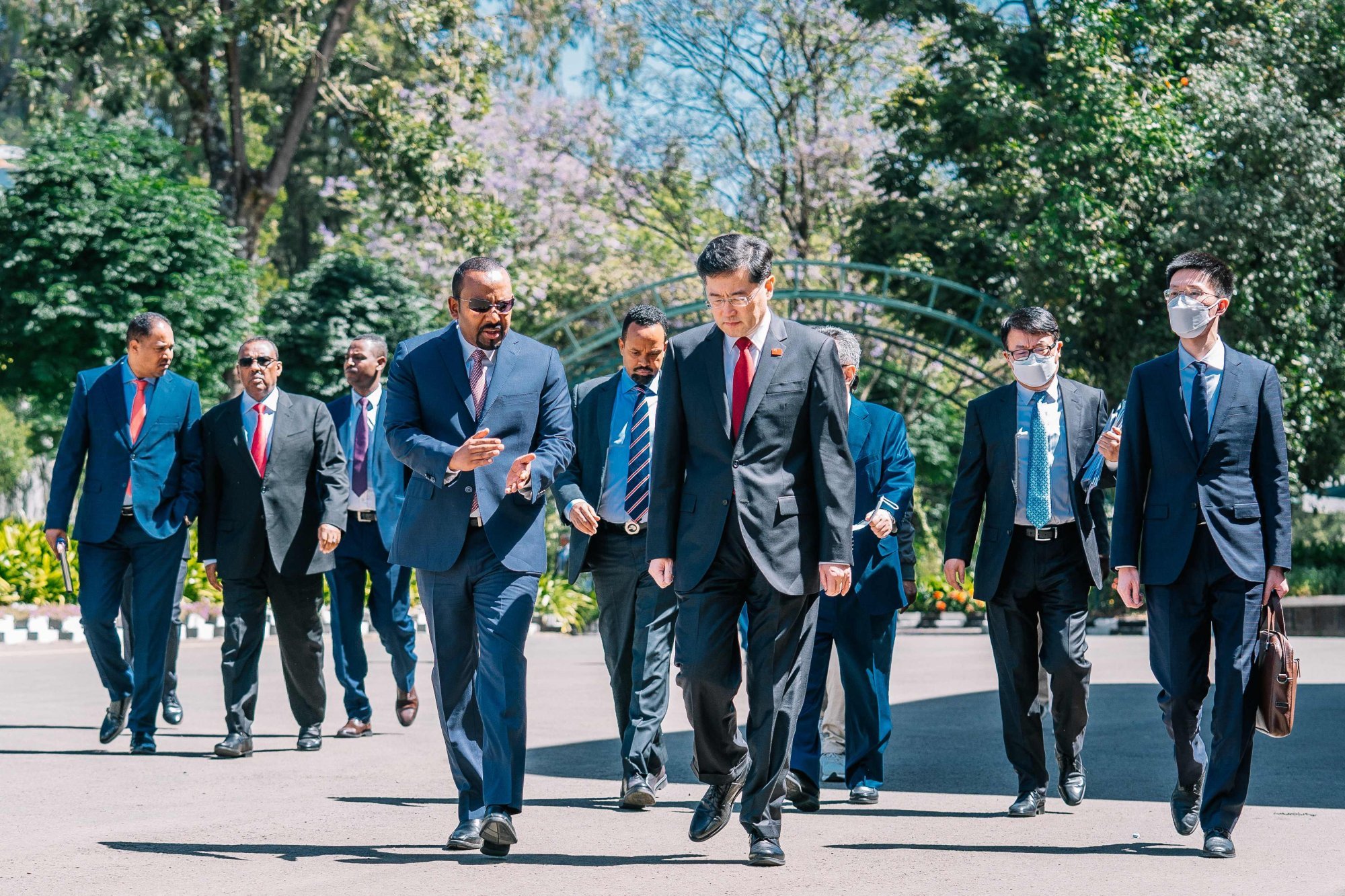
“It appointed special envoy Xue Bing ostensibly to mediate but as far as one can tell, Xue stayed away from it all, and was not involved in brokering the [peace] talks that took place in South Africa,” Nantulya said. “And yet, over 600 Chinese nationals had to be evacuated from Tigray due to the conflict.”
The Tigray region hosts some major Chinese investments including the Welkait Sugar Development Project – one of Ethiopia’s 13 sugar factories – as well as employees of Chinese energy giant Gezhouba Group who had been working on a water project supposed to have been completed by now.
“China clearly wants to get these projects going again and to demonstrate that it is providing ‘peace dividends’ to Ethiopia,” Nantulya said.
Ethiopia government and Tigray forces agree to end fighting after 2 years
Qin arrived in Addis Ababa last Tuesday and met Prime Minister Ahmed and other government officials, promising that China would work with Ethiopia to rebuild Tigray following the ceasefire between Ethiopian forces and the TPLF.
During his stay in the capital Addis Ababa, which is also the seat of the African Union, Qin outlined where he saw Sino-African relations heading over the next three years.
Meeting African Union Commission chairman Moussa Faki Mahamat at the group’s headquarters on Wednesday, Qin said China would encourage more in-person bilateral interactions, which had been affected by Covid-19 restrictions, and would also deepen relations with the union through the provision of new opportunities for the continent.
China denies creating ‘debt trap’ for African countries
China would also upgrade China-Africa cooperation to speed up the delivery of promises made during the Forum on China–Africa Cooperation and help Africa increase its representation and voice on the UN Security Council and other international organisations, such as the G20, he said.
At the top of Qin’s list was the resumption of training and education programmes that had stalled due to Covid-19 travel restrictions.
“Many students did not complete their degrees and have been in limbo,” Nantulya said. “China resorted to online and hybrid summits – including military to military engagements – but these do not have the same feel or gravitas.”
He said the training, scholarship and fellowship programmes were essentially the forum’s flagship projects.
When it came to championing and lifting Africa’s voice and interests internationally, Nantulya said: “Qin was basically addressing a popular theme and trying to capitalise on a narrative that suggests that China offers African countries an opportunity to become more relevant on the world stage.
China’s growing influence in Africa extends to arms sales, report says
“It should be recalled that Africa has something China needs to increase its clout at the multilateral level, that is, its voting and representational strength.”
Emmanuel Matambo, research director at the University of Johannesburg’s Centre for Africa-China Studies, said deepening African Union-China relations was important and went to the heart of how much leverage individual African countries would have in their relations with China.
“Africa will more likely extract more dividends from its relationship with China,” Matambo said.
However, he said there was a need to deepen mutual economic interaction. “While African governments do not question China’s continued self-reference as a developing country, this description is becoming more inapposite as China has been the second-biggest economy for the last 14 years, and it has developed massively in technology and poverty reduction,” Matambo noted.
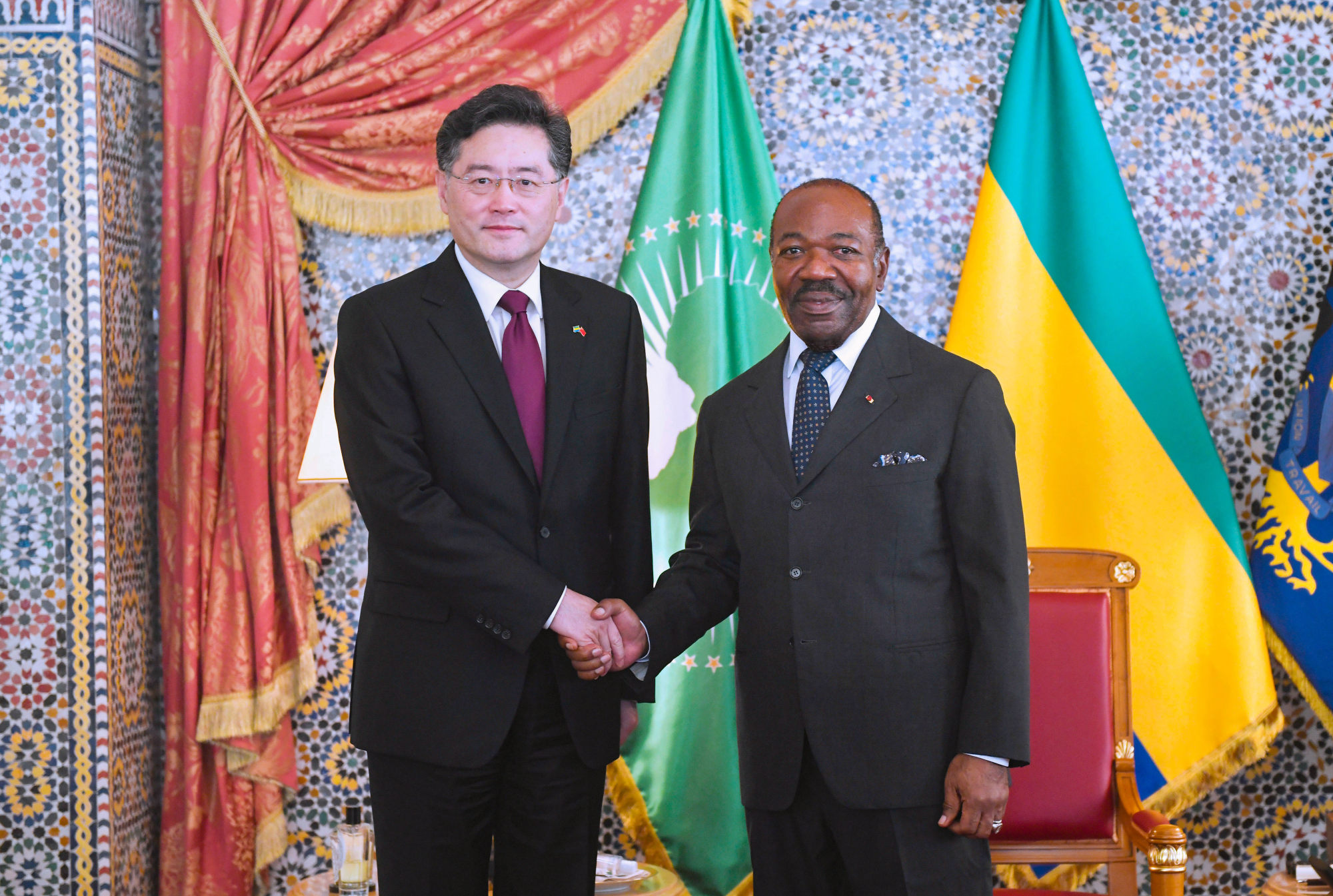
From Ethiopia, Qin travelled to Gabon, where he met Gabonese President Ali Bongo Ondimba in Libreville and promised that China would help the country pursue high-quality cooperation through the Belt and Road Initiative.
Gabon exports oil and manganese ore to China, which is also one of the biggest destinations for Gabonese wood and wood products.
Tim Zajontz, a research fellow at the Centre for International and Comparative Politics at Stellenbosch University in South Africa, said China was Gabon’s biggest trading partner, while Gabon was “also an ally for Beijing in global politics, as the country currently occupies a seat in the UN Security Council”.
End of ‘Angola model’ sees number of Chinese in oil-rich country plummet
But Chinese economic presence in Angola had waned markedly under President Joao Lourenco, who has tried to diversify Angola’s international partnerships, Zajontz said.
“The enormous amounts of debt that Angola owes to China has put an additional strain on the two countries’ relations,” he said. “Qin’s visit to Luanda is therefore a confidence-building exercise to reverse the estrangement in recent years.”
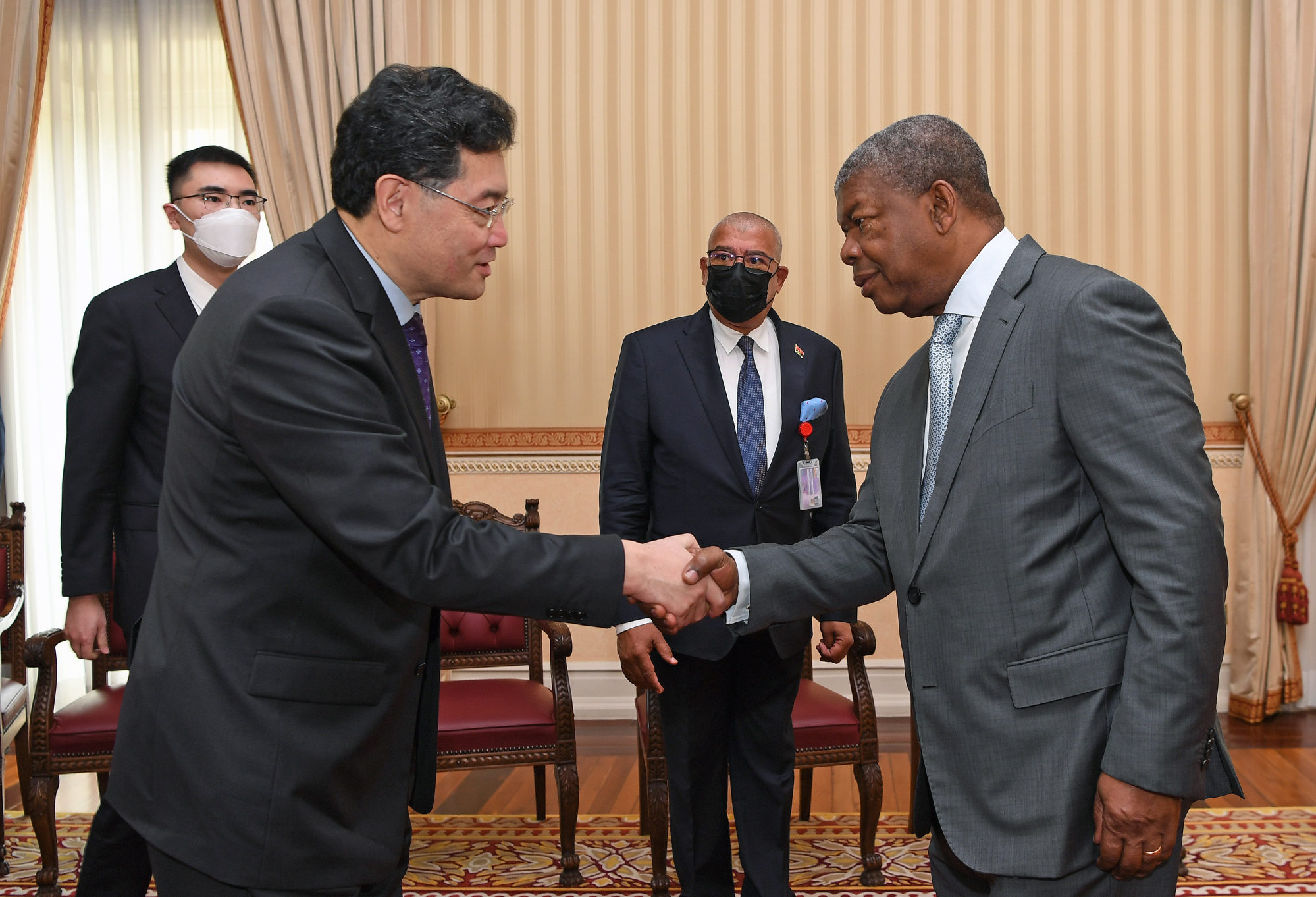
Qin met Lourenco on Friday as Angola marked the 40th anniversary of the establishment of diplomatic relations with China. Lourenco said the airports, hydropower stations, roads and ports supported by China were progressing smoothly, “playing an indispensable role in the post-war reconstruction and economic and social development of Angola”.
“Chinese companies have made positive contributions to the improvement of security infrastructure and people’s livelihoods,” Lourenco said.
Qin said China appreciated Angola’s active mediation of regional hotspots and supported Angola playing a greater role in international and regional affairs.
On Friday, Qin was in the Beninese city of Cotonou where he met President Patrice Talon, who said the West African nation “looks forward to learning from China’s experience, deepening and expanding cooperation, and accelerating national development and revitalisation.”
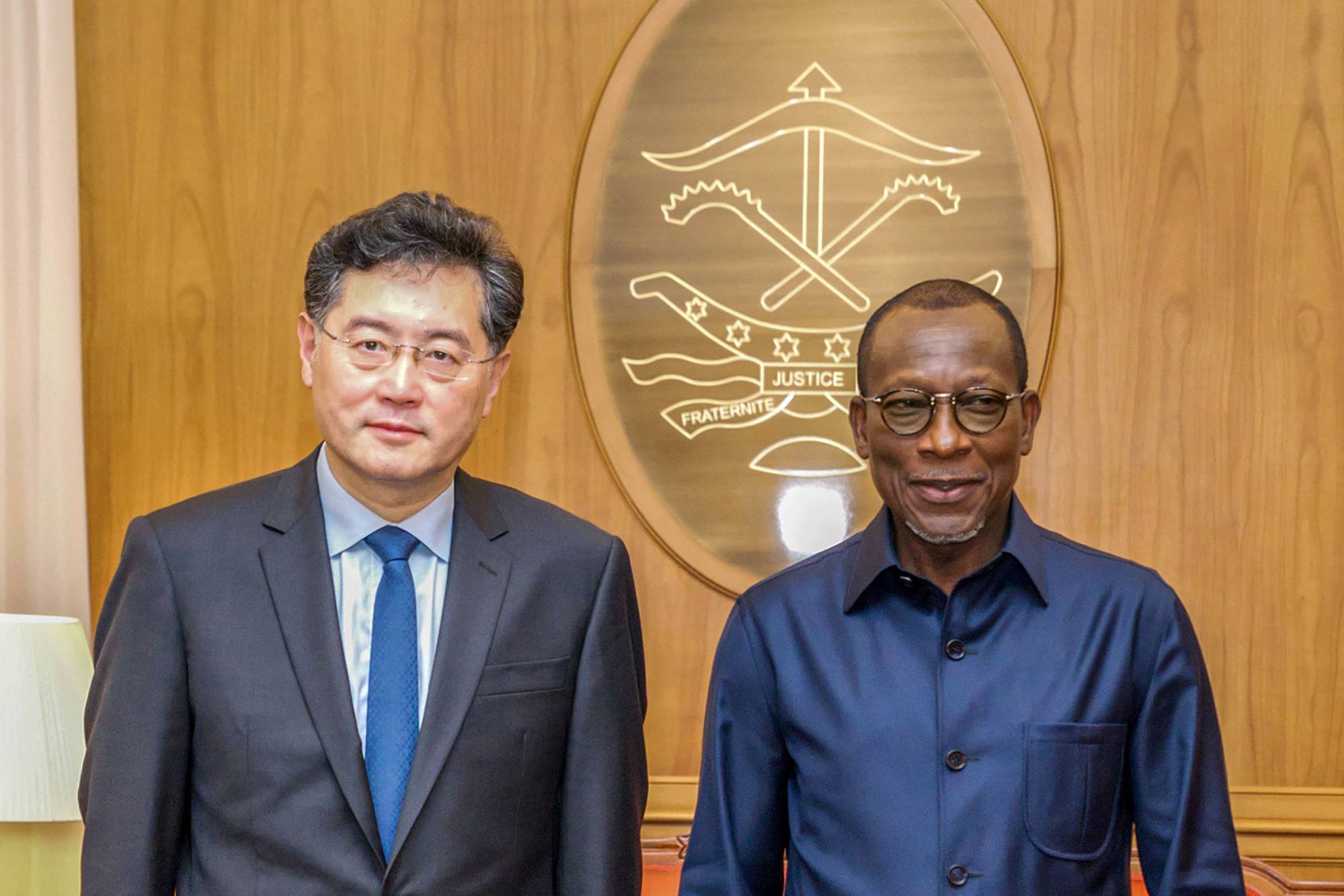
Beijing will encourage more Chinese companies to invest in Benin, Qin said, adding he hoped “that Benin will safeguard the safety and legitimate rights and interests of Chinese institutions and personnel”.
The last stop on Qin’s African tour was Egypt. The country was a major belt and road node, as indicated by the establishment of the new China–Egypt Suez Canal Economic Zone, Nantulya said. It was also a major security partner, he said, noting that China was building the new administrative capital in Cairo.
Benjamin Barton, an associate professor at the University of Nottingham’s Malaysia campus, said Angola, Ethiopia and Egypt were states with long-standing relations of significance with China – on top of their relative commercial importance.
Barton said that for Angola, the bulk of exchanges related to matters of debt restructuring and the continued supply of its primary commodities to the Chinese market. While for Egypt and Ethiopia, he said there might be more political matters to discuss.
Unrest in Ethiopia had regional ramifications but also for China, since it was not good for Chinese businesses based in Ethiopia and neighbouring Djibouti. Then there was also the ongoing row between Egypt, Ethiopia and Sudan over the Grand Ethiopian Renaissance Dam project.
“China has recently stated its desire to be more firmly seated as a peace broker on cross-border conflicts or cases of civil strife in Africa,” Barton pointed out.


